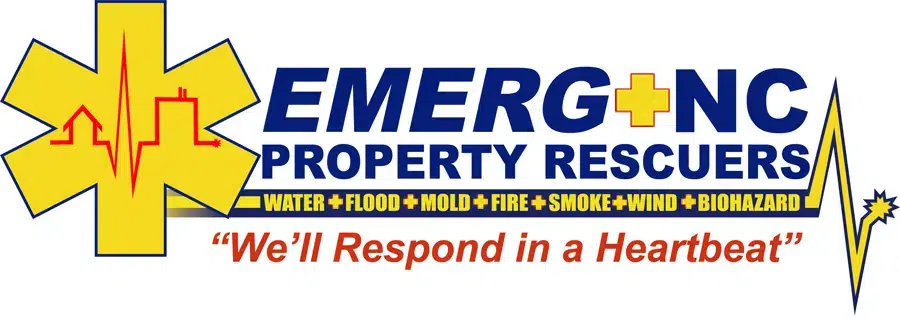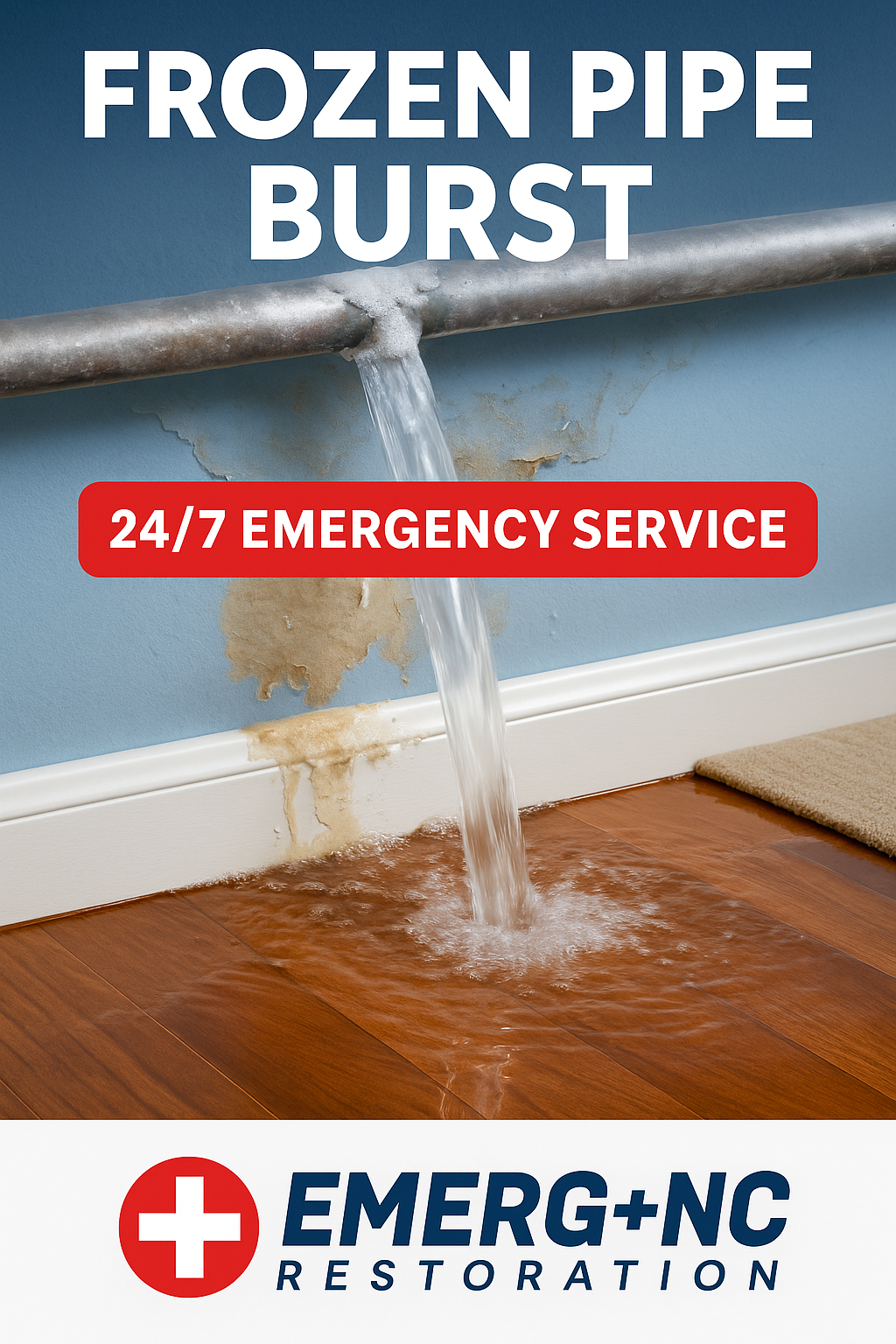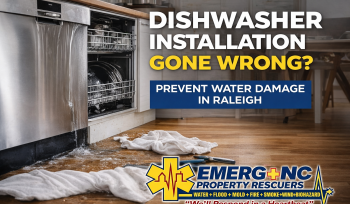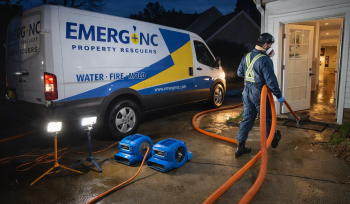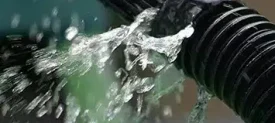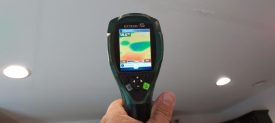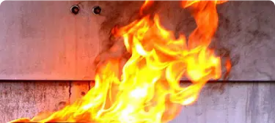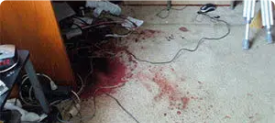By Ryan Oakley, Owner of EMERG+NC Property Rescuers
When temperatures drop in Wake County, one of the fastest ways a home can suffer major water damage is a frozen pipe that bursts without warning. It happens quietly behind walls, under sinks, or inside crawlspaces, and within minutes a small fracture can turn into gallons of water flooding your floors.
At EMERG+NC Property Rescuers, we see this every winter. A cold snap hits, a pipe freezes, pressure builds, and the moment the pipe thaws, it splits. By the time homeowners notice, drywall, insulation, flooring, electrical systems, and personal belongings may already be damaged.
This guide explains what causes frozen pipes, how to prevent them, and what to do if you discover water damage this winter.
Why Pipes Burst When They Freeze
A frozen pipe does not burst because of ice expanding inside the pipe. It bursts because freezing blocks the line and creates pressure between the blockage and the faucet. Once that pressure has nowhere to go, the pipe fails.
Common freeze points in North Carolina homes include:
• Crawlspaces
• Exterior walls
• Uninsulated pipes
• Garages
• Attics
• Outdoor spigots
• Laundry rooms located on exterior walls
Even newer homes in Fuquay Varina, Raleigh, Holly Springs, Cary, and Apex can experience frozen pipe damage during rapid overnight drops.
Early Signs Your Pipes May Be Freezing
If you catch these signs early, you may prevent thousands in damage:
• Slow or no water flow
• Frost on exposed pipes
• Strange gurgling noises
• Water pressure changes
• Unheated rooms feeling colder than usual
• Condensation or damp odors coming from walls or floors
If water stops completely, the line may already be frozen.
What To Do If a Pipe Bursts
A burst pipe is a true emergency. Here are the steps the IICRC S500 Standard recommends for water damage response:
- Turn off your main water supply
- Shut off electrical breakers if water is near outlets
- Mop and remove standing water if safe
- Call a licensed water damage restoration company
- Start professional extraction and structural drying quickly
Water left untreated for 24 to 48 hours can begin growing mold. The EPA stresses fast action to avoid contamination issues.
How EMERG+NC Responds to Frozen Pipe Emergencies
Our team follows IICRC certified drying methods and responds immediately with:
• High powered extraction units
• Thermal cameras to locate moisture inside walls
• Structural drying systems
• Dehumidification
• Mold prevention treatments
• Documentation for insurance claims
We work directly with insurance adjusters to reduce delays and protect your coverage.
If you need help now, call us at (919) 363-7462 or (844) EMERG+NC.
Winter Prevention Tips for Wake County Homeowners
A little preparation can save thousands in repairs. Here is what we recommend:
Insulate vulnerable pipes
Pipes in crawlspaces, exterior walls, garages, or attics should be insulated. Even inexpensive foam sleeves can help.
Let a slow drip run on extremely cold nights
Running water is less likely to freeze.
Open cabinet doors
This allows warmer air to reach the pipes under sinks.
Disconnect outdoor hoses
A connected hose can freeze the entire line back into the wall.
Add heat to cold zones
A small space heater (used safely) can prevent freezing.
Know where your water shutoff is located
This saves time during an emergency.
For more preparedness guidance, FEMA also provides winter storm advice:
https://www.ready.gov/winter-weather
Local Focus: Why Wake County Homes Are at Higher Risk
Wake County’s climate causes fast freeze–thaw cycles. Nighttime temps can drop into the teens, then rebound the next afternoon. This rapid shift makes pipe pressure spikes more likely.
Homes in the following areas are especially vulnerable due to crawlspace construction and elevated plumbing:
• Fuquay Varina
• Holly Springs
• Cary
• Apex
• Raleigh
• Garner
• Willow Spring
Many homes built from 1995 to 2015 used plumbing layouts that run supply lines through uninsulated spaces.
• Emergency Water Removal
https://emerg-nc.com/emergency-water-removal/
• Water Damage Restoration Raleigh
https://emerg-nc.com/locations/water-damage-restoration-raleigh/
• Water Damage Restoration Cary
https://emerg-nc.com/locations/water-damage-restoration-cary/
• Mold Removal Services
https://emerg-nc.com/mold-remediation/
• About EMERG+NC
https://emerg-nc.com/about-us/
Why Homeowners Trust EMERG+NC
For 17 years, our team has helped families recover from winter storms, frozen pipes, flooded crawlspaces, and sudden water damage. We are:
• Locally owned
• Fully insured
• IICRC certified
• Known for quick response
• Recommended by insurance adjusters
• Equipped for large and small losses
Our branded white and yellow service vans can be seen throughout Wake County every winter as we help homeowners stay safe and dry.
If You See Water, Act Fast
A frozen pipe can leak more than 250 gallons per day. The sooner we can assess the damage, the more of your home we can save.
Call EMERG+NC Property Rescuers anytime:
(919) 363-7462
(844) EMERG+NC
Or request emergency help here:
https://emerg-nc.com/contact-us/
